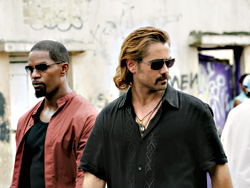Why not set it in Detroit? Or Cleveland? Or Fargo in winter? Or some ash-gray Central European city where bright colors don’t exist and the sun never shines? Notwithstanding Florida’s Southern latitude, Michael Mann has drained the UV and pastels out his own old TV series, Miami Vice. Where are the babes? The boobs? The bling? The alligators and neon? Grimly determined to rebrand his franchise and rewrite cultural history, Mann has turned Crockett and Tubbs into a solemn pair of nighthawks, most at home in pulsing clubs, ominous parking garages, and cigarette boats racing up canals by moonlight, who squint at the rosy dawn with stubble and dread. They can’t do their jobs in broad daylight, since their jobs are as undercover cops; the whole point to their dour professionalism is conning the cons and deflecting scrutiny. And the whole point to Mann’s movie is that this is work, hard work, detail work, manly man’s work, Hemingway work that takes a toll on a man—especially if he should foolishly unclench his heart for an instant to a woman. For this, you see, would distract him from his work and compromise his total, 110 percent commitment to the men on his team (which actually does include a few women, but they act like men when it comes to guns, gizmos, and blowing stuff up).
Although there are two heterosexual love stories amid the bouncing brass shell casings of Vice, the central relationship is between Crockett (Colin Farrell) and Tubbs (Jamie Foxx). Mann is drawing on the Howard Hawks–John Ford–Sam Peckinpah tradition of chaste cowboy love. It’s totally straight, not Brokeback pastoral, the bond of partners on the range, buddies in combat, fellow narcs undercover. “I would never doubt you,” Tubbs passionately tells Crockett, even when it seems he’s compromised their entire sting operation by falling for the Cuban-Chinese banker/mistress (Gong Li) of a Colombian drug lord. Meanwhile, Tubbs is more safely involved with a police colleague (English actress Naomie Harris from the latest Pirates of the Caribbean). Each has his honey, in other words, but the mission comes first.
Foxx and Farrell were mere kids when Philip Michael Thomas and Don Johnson graced the small screen in Vice‘s first go-round (1984–89). The latter two were the Butch Cassidy and the Sundance Kid of their MTV era, lawmen dressed in Armani outlaw style. You can almost imagine the cute little future actors running around Texas and Ireland, respectively, playing cops and narco-terrorists. Foxx and Farrell now get their own Ferrari, and the movie doesn’t deny them (or us) the pleasure of driving around Miami to a brooding techno underscore (most of it by John Murphy, and most of the driving, again, at night).
Miami Vice is most smoothly effective in these visceral scenes of movement—Tubbs piloting their plane low over the ocean; Crockett blasting across the waves in a speeding catamaran bound for Cuba; their team silently closing in on a tense trailer-park hostage situation (this being the movie’s best set piece). When a superior considers ending their operation, Crockett protests, “We wanna stay under!” like a kid being called in to supper. The game is too exciting to quit, and—for Crockett at least—the double life is too seductive. (Li is plenty alluring in this regard, though her English isn’t a whole lot better than in Memoirs of a Geisha.)
MANN HAS DONE everything to disavow his old TV series, recently telling the London Telegraph, “I’m not interested in nostalgia. What was important about Miami Vice wasn’t the clothes, the colors, or any of that.” (This will come as a shock to fans, who properly understood that nothing was important about MV.) So there are no cameos from the old cast, no winks or wisecracks, and a cover of Phil Collins’ “In the Air Tonight” has to wait for the final credits. So strenuously does Mann avoid one legacy that he forgets another: The movie isn’t rivaled by the show, but by all the other drug-trade movies we’ve seen. In Scarface or Blow or Traffic or even The French Connection, the criminal mechanics and police procedures are no less exhaustively detailed. Yet those are movies you remember for the eccentrics—the rogue cops and charismatic villains. Anyone, any film, can stack up bricks of coke, wire millions from laptops, exchange briefcases, or go deep, deep undercover. And in his mania for methodology, Mann never makes Crockett and Tubbs more than supremely competent technicians of law enforcement. He’s been writing and directing movies for 25 years, but the only characters you remember are those he inherited—Muhammad Ali and Hannibal Lecter. Instead of dialogue, everyone speaks in terse, tough fortune-cookie aphorisms: “Time is luck,” and “Probability is like gravity.” Instead of a script, he probably gives his actors a schematic diagram.
Most fundamentally, Mann misjudges his audience. If we want a cool, minimalist cop flick, give us that, only with a different title. If we want a Miami Vice movie, give us an authentically ’80s spoof with Owen Wilson and Dave Chappelle. But don’t tell us the original show had the grandeur of Mamet or Shakespeare (both of whom understand how to mix genres).
Farrell and Foxx do have ample street cred, however. Despite one curious speech about his daddy playing for the Allman brothers and being a trucker—does this lead to a song?—Farrell can now add to his impressive repertory the figure of Southern bad-ass cop. And dancer. In the film’s most charming episode, he and Li skim across the strait to Havana for music and mojitos. (In the future, movies ought to require that all action heroes must dance in at least one scene.) I’m not sure why Foxx, top-billed and with his Oscar, wanted the second- banana role. For his next film, he can always go back to comedy. For Mann, that won’t be an option.








